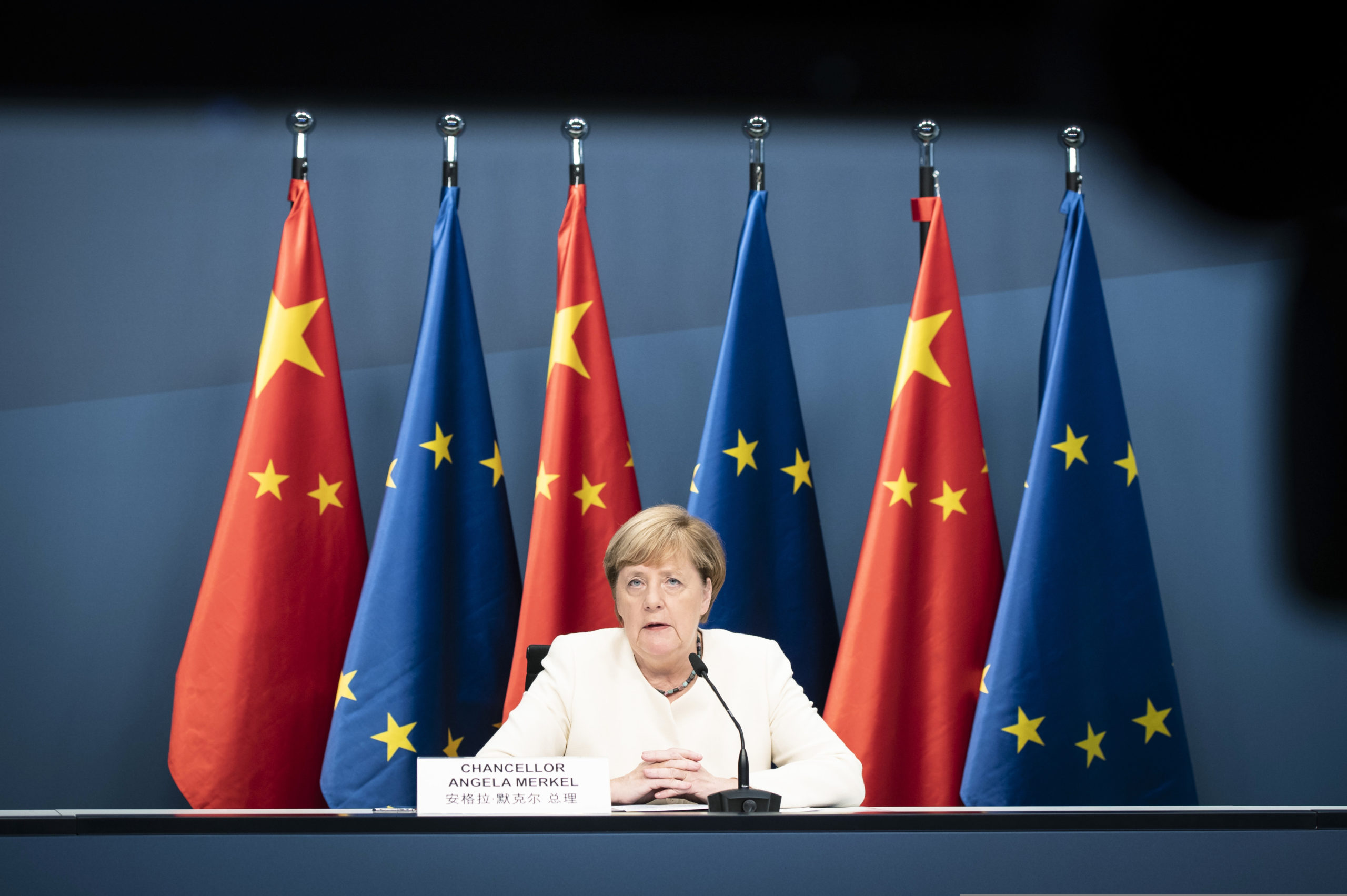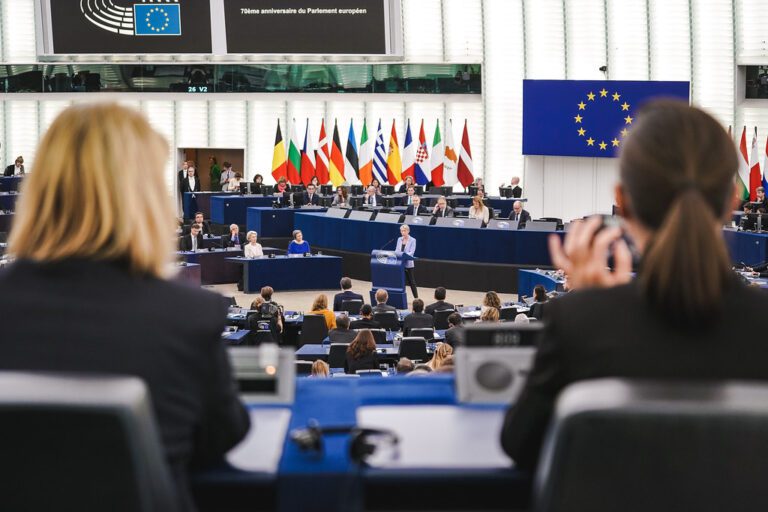
The long ‘reign’ of German Chancellor Angela Merkel will finally end in September. Along with her succession, a political shift for the European powerhouse is most certainly underway.
Looking back at 16 years under Merkel, Germany’s China policy has been a constant tension between moral standards and pragmatism on China, time and again irritating Germany’s partners, especially the US. Due to the global financial crisis and in particular the consequences for the automotive industry, Germany strengthened its ties with China’s flourishing economy. Consequently, the attempt to confront China with value-based policies gave way to an investment and trade-driven approach. In Berlin, Merkel managed Germany’s China policy from the Chancellor’s office, which meant that political change concerning Beijing was unlikely, while at the same time a certain level of reliability and stability was maintained within changing government constellations.
Regardless of the outcome of the next federal election, Germany is entering a transitional period which pertinently comprises a realignment of the relations between Beijing and Berlin. While the conservative twin parties CDU/CSU have the greatest chance to lead the future German government, the Alliance 90/The Greens are also believed to have solid prospects of returning to government. Although it is possible to see social-democratic SPD, liberal FDP or even socialist DIE LINKE in government positions, the debate of how to engage with China will be most likely shaped by CDU/CSU and the Greens.
Looking for Merkel 2.0
Since chancellor Merkel made clear that she will not run for a fifth term, the rivalry for the CDU/CSU chancellor’s candidacy is now between newly elected CDU party leader and North Rhine-Westphalian head of government Armin Laschet and Markus Söder, leader of the CSU and Bavarian head of government. From today’s perspective, it seems that both men are unlikely to contest the Merkel attitude towards China.
In 2020, taking his cue from Merkel, Söder called for maintaining a strategic dialogue with China and putting high priority on the economic recovery from the COVID-19 crisis. Moreover, he backed chancellor Merkel when she was criticized for being too lenient towards China, after repression and violence intensified in Hong Kong. In the aftermath of the Hong Kong National Security Law, Söder distinctly expressed skepticism against political sanctions directed at China.
As the former Bavarian Minister of Finance, Söder acknowledges the relevance of the huge Chinese market for German manufacturers. However he also faces calls from within the CSU for an entirely European China strategy and to give China policy a higher priority by appointing a German China envoy within the German government.
Although his competitor, Armin Laschet, speaks of a long-lasting systemic competition between liberal societies and China, his position as leader of a German federal state with strong economic ties to China has visibly shaped his position. In 2019, when asked about the role of the Chinese telecommunication company Huawei in Germany’s 5G mobile phone grid, Laschet stressed Germany’s strategic interest in free trade and technological investment as an export-oriented country. Despite security concerns Laschet warned explicitly against excluding Huawei from participating in the 5G rollout.
Greens’ Deal: The Risk of Losing China on Climate
By calling for a more value-oriented China policy the Greens have conversely tried to challenge Angela Merkel and her possible successors. Just recently, Greens foreign policy experts were angered by the hurriedly concluded negotiations for a Comprehensive Agreement on Investment (CAI), especially the lack of clarity concerning environmental sustainability and workers’ rights. Reinhard Buetikofer, chairman of the European Parliament’s delegation for relations with China, announced that he will campaign against ratification of the treaty by the European Parliament. In Berlin, Greens co-leader Annalena Baerbock called for a tougher stance against China over its security crackdown in Hong Kong, demanding the immediate suspension of the bilateral extradition treaty.
These developments among other factors have made the Greens adopt the most hawkish line on China in Berlin. In contrast to conservative officials, they draw a line against Merkel’s slogan “Wandel durch Handel” (change through trade) which has lost credibility in the course of time. Instead, the party underlines that only a joint EU-China policy can meet the challenges ahead and emphasizes Germany’s responsibility in forging a European consensus towards China.
However, as protection of climate and other environmental aspects are at the heart of the party, the Greens face the risk of losing China over the climate issue. Despite massive investment in renewable energies, China’s overcapacities in steel production and its countless power plants based on fossil fuel make the Greens doubt Beijing’s commitment to climate matters. The Greens’ proposal to end the simple juxtaposition of cooperation, competition, and rivalry might damage the working relations with China on climate protection. For the Greens, the only way to escape this dilemma is to make the German multidimensional competition with China a broader European one.
Towards a Europeanized China policy
In the Post-Merkel era, Germany’s China policy must become more versatile, while Merkel’s old-fashioned balancing act is simultaneously becoming increasingly untenable. The immense dependency on the Chinese market, together with China’s provocative posture on the world stage call for change. The crucial question is if the future German Federal Government can convert newly gained perspectives into a China policy, which consistently raises the issues of human rights and climate, or if disagreement within a new coalition gives Beijing the chance to divide and conquer.
Regardless of the outcome of the election, the Greens will announce their European perspective towards China more prominently as being politically shaped by years of opposition in the Bundestag and the European Parliament. However, the strength of their voice on human rights depends not just on the position they will obtain after the election, but on the priority the party will give to climate cooperation. The party will face the same challenge that Merkel did: that it is not possible to separate climate cooperation from overall rivalry.
Even if Merkel’s conservative successors will rather try to repair the rifts in the “Wandel durch Handel” strategy, pushback is emerging within the CDU and the CSU. Both twin parties cannot ignore the fact that institutions like Germany’s major business organization BDI demand to strengthen the EU in competition with China, predicting danger for the socially balanced market economy of Germany and Europe.
Still, it would be premature to expect a political U-turn after September. As global conditions of Merkel’s China policy do not change initially, a shift in rhetoric is much more likely than a shift in actual policy. To turn rhetoric into politics it is even more important that the EU and its member states make their voices heard in Berlin and lobby for a more Europeanized China policy. It must become clear that a continued unilateral behavior by Berlin will make it easier for Beijing to put smaller EU member states under pressure. In the long run only a Europeanized China policy will serve Germany’s economic and political interests.
What will be decisive during this realignment is the approach and rhetoric coming from the new Biden administration. According to the statement by US-Secretary of State Antony Blinken, to approach China from a position of strength, Washington will try to incorporate the new German administration into a more unified transatlantic stance on China. These shifts might signal the last gasp of Merkel’s antiquated approach to China. Nonetheless, as Washington tries to push the new German administration to take sides in the US-China competition, it is ultimately a Europeanized China policy which will increase Germany’s scope, and effectiveness, of action.
Written by
Jonathan Lehrer
lehrer_jonathanJonathan Lehrer is a Program Manager at Körber-Stiftung and the Editor of The Berlin Pulse. He holds a Master's degree in International Relations from Technical University of Dresden in Germany. He also studied at Qingdao University.


